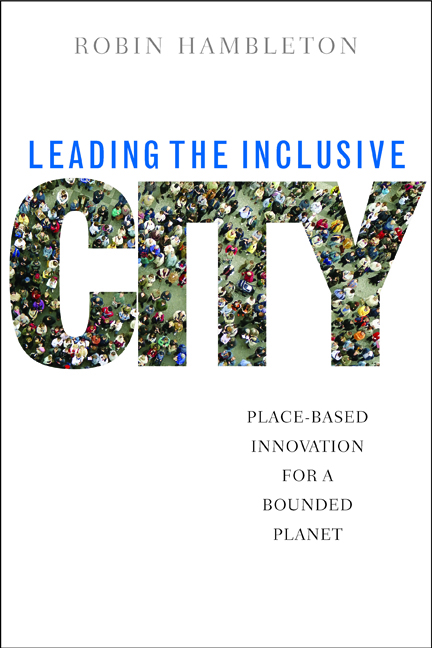Book contents
- Frontmatter
- Dedication
- Contents
- List of figures
- List of innovation stories
- About the author
- Preface
- A guide to the book
- Overview
- Part 1 Diagnosis: Understanding trends and challenges
- Part 2 Concepts: Place, leadership, innovation and democratic governance
- Part 3 Experiences: Place-based leadership in action
- Part 4 Lesson drawing: Insights and international learning
- Notes
- Appendix: International city networks and resources
- Acknowledgements
- References
- Index
Two - Global trends and our urban future
Published online by Cambridge University Press: 08 March 2022
- Frontmatter
- Dedication
- Contents
- List of figures
- List of innovation stories
- About the author
- Preface
- A guide to the book
- Overview
- Part 1 Diagnosis: Understanding trends and challenges
- Part 2 Concepts: Place, leadership, innovation and democratic governance
- Part 3 Experiences: Place-based leadership in action
- Part 4 Lesson drawing: Insights and international learning
- Notes
- Appendix: International city networks and resources
- Acknowledgements
- References
- Index
Summary
Even if the Earth's population stabilises toward the end of the century, as many demographers project, urbanisation will continue. The world is on the threshold of change as consequential as any in the history of civilisation Harm de Blij, The Power of Place, 2009
Introduction
The world is becoming increasingly urbanised, and the future wellbeing of both humanity and the planet are inextricably linked with our success or otherwise in dealing intelligently with urban growth and change. In recent years, however, it is globalisation – and not urbanisation – that has become the buzzword in public policy debates.
There is now a massive literature on the impact of globalisation on the future of society. But what does the term mean? Hopkins (2002, 16) defines globalisation as ‘a process that transforms economic, political, social and cultural relationships across countries, regions and continents by spreading them more broadly, making them more intense and increasing their velocity’. Hutton and Giddens (2000, vii) adopt a similar perspective in their analysis of globalisation, and suggest that: ‘It is the interaction of extraordinary technological innovation combined with the world-wide reach driven by global capitalism that gives today's change its particular complexion’ (2000, vii). Moynagh and Worsley (2008, 1) keep it nice and simple and define globalisation as: ‘… the world becoming more interdependent and integrated’. Underpinning all these definitions is the idea that global economic competition and international cultural exchange, coupled with the remarkable expansion of the Internet and modern communication technologies, are shrinking the planet.
This literature on globalisation is important and it deserves our attention. But our intoxication with all things global may have obscured the fact that another equally important process is also taking place – urbanisation. True, globalisation and urbanisation are inter-related processes, and some writers on globalisation have illuminated this interplay (Birch and Wachter 2011). But, in my view, urbanisation is a distinct process that deserves to be given much more attention. In this chapter I examine the astonishing movement of people to cities and sketch the contours of our global urban future. The urban areas of the world currently have a population of around 3.6 billion.
- Type
- Chapter
- Information
- Leading the Inclusive CityPlace-Based Innovation for a Bounded Planet, pp. 35 - 54Publisher: Bristol University PressPrint publication year: 2014



